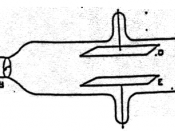William Crookes was one of the most important scientists of the nineteenth century both in the fields of chemistry and physics. He is well known for his invention of the Crooke's tube, and the discovery of thallium.
Crookes was born on the 17th of June in 1832 in London, England. He began his career in science at the age of sixteen when he attended the Royal College of Chemistry in London. He first attended college wanting to study organic chemistry. He was an attendant at the college; therefore, he could visit meetings at the Royal Institution in London. At one of these meetings, Crookes was influenced by a physicist to change the area of science he studied to physics. In 1856, after his father's death, Crookes inherited his father's money and used it to purchase his own scientific laboratory in London, England. After a few years of experimenting, he discovered the element thallium.
At the time of this, another scientist named C. A. Lamy also had also gotten a small sample of thallium and there was controversy over who would be credited with the discovery of thallium. This discovery helped Crookes to invent the radiometer in 1875. The radiometer is a device that measures the intensity of radiant energy. He later invented the vacuum tube which is the precursor of the x-ray tube. Beginning in 1887, he began investigating electrical charges through highly evacuated "Crookes Tubes." His work led to the foundation of J. J. Thomson's research in the 1890's on the discharge-tube phenomena. Later in his life, at the age of 68, Crookes began to investigate the phenomenon of radioactivity. Radioactivity had been discovered in 1896, and Crookes invented a device that would detect alpha particles emitted from the radioactive material. Crookes continued to have an interest in...


